ANZAC Day – Mine – Theirs – Ours
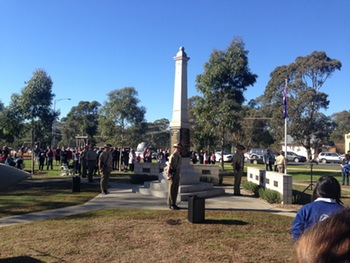
The Broadford ANZAC Day Commemoration was once again a solemn and moving ceremony.
The Broadford Branch of the RSL [Returned and Services League] is to be commended. To see so many hundreds of people attend, demonstrates both the high regard for the Broadford RSL and the importance with which this commemoration is held in the community.
This particular event held even more interest for me this year for a number of reasons.
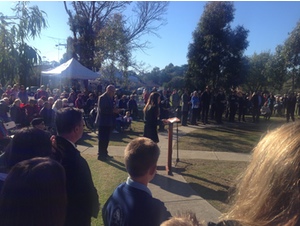
My daughter, Grace, was given the honour and privilege of delivering the Anzac Address [speech] at the Ceremony on behalf of all the young people that attended the recent Broadford Secondary College Battlefields Tour to France and Belgium.
Some of those attending at the Cenotaph have experienced war.
Many of those attending the ceremony have families that experienced war, suffered great loss and have their family members names on the Broadford Cenotaph.
There are no longer any veterans from World War 1 still alive today, so to some, it might seem quite odd that a 17 year old schoolgirl would make the speech at an Anzac Day commemoration.
In recent weeks there has been, sadly, a mild-controversy amongst the local community [and some considerable disappointment for those involved] about one anonymous letter-to-the-editor [yes, they are always nearly anonymous] of a local newspaper, raising concerns about a recent study-tour by Broadford Secondary College students [of which both my Daughter and Son participated] to visit the battlefields of World War 1 and World War 11 in France and Belgium.
The anonymous author raised [what I believe to be genuine but misguided and ill-informed] concerns about one image of the group of students dressed and equipped as World War 1 soldiers completing what is known as the “platoon experience” and perhaps ‘cheapening’ or ‘misundertanding’ the historical significance of ANZAC day.
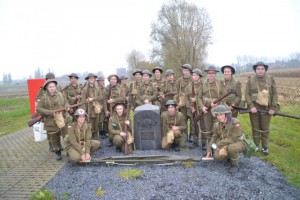
As a student of history, once professionally, and like many, having a personal interest, one understands that CONTEXT is everything.
This particular historical experience was conducted based on the thoroughly researched historical sequence of events of the day, an experienced historian guided the group through the battlefields and the students were clothed in full uniform, equipped with a rifle and organised as a member of the platoon. Each member was briefed to take on the role of an Australian who was actually there and throughout the day learned more about him as a person. They also begun to understand the physical efforts required in the trenches, the mental challenges of battles at close quarters and perhaps, for a moment, considered their own age-group and just how similar the diggers were to them. Considerable research had been conducted into stories of those who served in this battle to create an authentic experience and honour the memory of their sacrifice.
I doubt the anonymous writer experienced a history lesson like this in their school days.
The students also traveled to:
- the Flanders Field Museum,
- the Menin Gate ,
- the Fromelles Australian Memorial Park,
- Polygon Wood,
- Langemark German Cemetery
- Tyne Cot Cemetery
- Bullecourt Australian Memorial Park
- Pozieres
- Albert WWI Museum – Somme 1916 Museum
- Lochnager Crater
- Musee Franco-Australien (ECOLE DE VICTORIE) & VB Memorial
- Bray-Sur-Somme German Cemetery
- Le Hamel, Australian Memorial
- Bayeux Cathedral
- D-DAY Museum and Omaha beach and American Cemetery
If you are left in any doubt as to what this one particular day of nineteen such days meant to the students, you should browse some of their online comments and live-diary entries here.
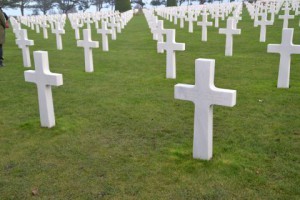
You should also ponder the Sea-of-White by Emma G.
I understand the concern for the solemnity of ANZAC traditions, yet also see a contradiction in the anonymous author’s logic. Sadly, “ownership” of traditions are those things in our culture that often create the most emotion and conflict and in this case, the anonymous author does not see or understand the full context of that image nor their own concern for “their” tradition.
We Will Remember Them
If traditions are to remain resilient through time, particularly when the familial connection may not exist, then the young must come to experience and understand the importance of those traditions [so valued by the anonymous writer] and choose to adopt those traditions and values in their own context. This is not something that simply happens or is forced on a generation, this occurs because the young-person can understand the historical context and interpret its meaning for their modern lives.
This does not simply happen. The professional expertise of teachers and educators create environments that challenge and inform. Thankfully, Broadford Secondary College has many such educators that I am happy to say support my own children in their journey.
Communities also support and nurture their young.
The anonymous writer did not understand the context of their own comments, rather, they simply responded to an image and perhaps a misjudgment of the calibre of young-people living and studying in our community.
If the anonymous writer considered more closely the quality of young people on the trip, the deep and encouraging support and guidance they received from the community which included no less than:
- RSL Victoria – ANZAC House
- Broadford RSL
- Kilmore RSL
- Lions Club of Broadford
- Goulburn Murray Credit Union Kilmore
- CWA Broadford Mt Piper Branch
and many many other businesses, families and individuals providing support and assistance, then I am sure the anonymous writer would have had a greater understanding and no need to publish, anonymously, a criticism that was both ill-informed and poorly timed.
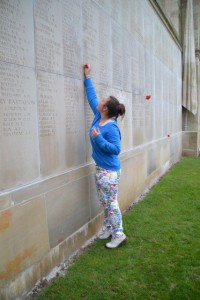
Thankfully, the foresight and vision of those involved in the genuine stewardship of the ANZAC tradition, the members of the Broadford RSL, chose to recognise the young people from Broadford Secondary College that made the effort to tour across Europe by inviting one of their own to address the Anzac Day commemorative service.
Many of the families in the local district had students visit the graves of family members.
The students were visiting some graves of soldiers whose families have never been able to visit in-person.
Others where visiting graves as representatives of families from the district that could not return. Others still, were simply offering a remembrance for an unknown soldier, because they chose to.
Once such example of a remembrance:
Today at the Villers Brettoneux cemetery, many students laid poppies or gave eulogies at the memorial site of their researched soldier. My solider’s name was Lambert Victor Gadd, given to me by Mrs Mary Dodge.
At his memorial site, I read a poem by Wilfred Owen, called Arms and the Boy.
Let the boy try along this bayonet-blade
How cold steel is, and keen with hunger of blood;
Blue with all malice, like a madman’s flash;
And thinly drawn with famishing for flesh.
Lend him to stroke these blind, blunt bullet-heads
Which long to muzzle in hearts of lads.
Or give him cartridges of fine zinc teeth,
Sharp with the sharpness of grief and death.
For his teeth seem for laughing round an apple.
There lurk no claws behind his fingers supple;
And God will grow no talons at his heels,
Not antlers through the thickness of his curls.
I know, at age sixteen, that I would not have had the consideration, foresight or emotional intelligence to make such a statement.
From what I have seen and heard from those young people who attended the Broadford Secondary College Battlefields Tour and from the overwhelmingly and singularly positive responses from the attendees at the Anzac Ceremony, the traditions and values that the anonymous writer feared for and perhaps was unwilling to share, are, I can safely assert, alive and well in the next generation.
A generation that understands and freely adopts the key messages of the ANZAC Tradition.
As any good historian would say, don’t take my word for it, read the evidence and decide for yourself…
You can read Grace’s words here. [PDF 35KB]
Links
- RSL Victoria – ANZAC House
- Broadford RSL
- Kilmore RSL
- Lions Club of Broadford
- Goulburn Murray Credit Union Kilmore
- CWA Broadford Mt Piper Branch



